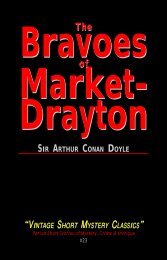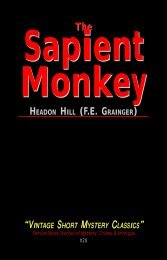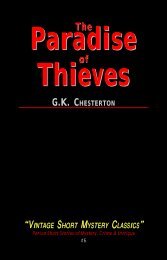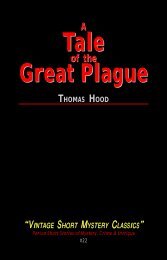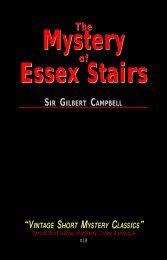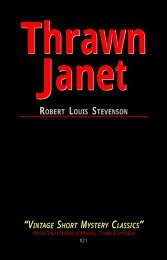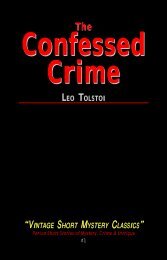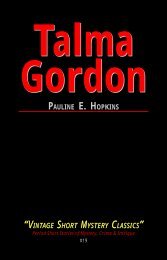The Masque of the Red Death - Hornpipe Vintage Publications
The Masque of the Red Death - Hornpipe Vintage Publications
The Masque of the Red Death - Hornpipe Vintage Publications
Create successful ePaper yourself
Turn your PDF publications into a flip-book with our unique Google optimized e-Paper software.
<strong>The</strong><br />
<strong>Masque</strong><br />
<strong>of</strong> <strong>the</strong><br />
<strong>Red</strong> <strong>Death</strong><br />
EDGAR ALLAN POE<br />
“VINTAGE SHORT MYSTERY CLASSICS”<br />
Period Short Stories <strong>of</strong> Mystery, Crime & Intrigue<br />
#30
All short stories in <strong>the</strong> “<strong>Vintage</strong> Short Mystery Classics” series are<br />
period works now in <strong>the</strong> public domain. <strong>The</strong>se e-book presentations<br />
are published by:<br />
<strong>Hornpipe</strong> <strong>Vintage</strong> <strong>Publications</strong><br />
P.O. Box 18428<br />
Spartanburg, SC 29318<br />
www.hornpipe.com/mysclas.htm<br />
“<strong>Vintage</strong> Short Mystery Classics” have been selected by Daniel Elton<br />
Harmon, author <strong>of</strong> “<strong>The</strong> Harper Chronicles,” with <strong>the</strong> intent <strong>of</strong> introducing<br />
new readers to notable works <strong>of</strong> short historical fiction in<br />
<strong>the</strong> mystery/gothic/crime vein. For more information, please visit <strong>the</strong><br />
author’s Web site at www.danieleltonharmon.com.<br />
Mention <strong>of</strong> his name elicits grimaces and visions <strong>of</strong> crimson horror.<br />
To me, although Edgar Allan Poe (1809-49) concentrated much<br />
<strong>of</strong> his writing on <strong>the</strong> grotesque and gruesome, he was a gifted giant<br />
<strong>of</strong> literatary composition and a man with a message—that is to say,<br />
with many and varied messages, which <strong>of</strong>ten bore moral warnings<br />
and wisdom. <strong>The</strong> first <strong>of</strong> his stories to appear in this series,<br />
“<strong>The</strong> Murders in <strong>the</strong> Rue Morgue” (#16), describes a particularly gory<br />
scene <strong>of</strong> human carnage but is, in essence, an ingenious early study<br />
in <strong>the</strong> logistics <strong>of</strong> detection and deduction. In radical contrast,<br />
“<strong>The</strong> <strong>Masque</strong> <strong>of</strong> <strong>the</strong> <strong>Red</strong> <strong>Death</strong>” is a morality fable. It illustrates<br />
that we can escape our tribulations temporarily,<br />
but ultimately we face an end <strong>of</strong> security, <strong>the</strong>n <strong>the</strong> judgment.<br />
—DEH
<strong>The</strong> <strong>Masque</strong><br />
Of <strong>the</strong> <strong>Red</strong> <strong>Death</strong><br />
<strong>The</strong> “<strong>Red</strong> <strong>Death</strong>” had long devastated <strong>the</strong> country.<br />
No pestilence had ever been so fatal, or so hideous.<br />
Blood was its Avatar and its seal—<strong>the</strong> redness<br />
and <strong>the</strong> horror <strong>of</strong> blood. <strong>The</strong>re were sharp pains, and<br />
sudden dizziness, and <strong>the</strong>n pr<strong>of</strong>use bleeding at <strong>the</strong> pores,<br />
with dissolution. <strong>The</strong> scarlet stains upon <strong>the</strong> body and especially<br />
upon <strong>the</strong> face <strong>of</strong> <strong>the</strong> victim, were <strong>the</strong> pest ban which<br />
shut him out from <strong>the</strong> aid and from <strong>the</strong> sympathy <strong>of</strong> his<br />
fellow-men. And <strong>the</strong> whole seizure, progress, and termination<br />
<strong>of</strong> <strong>the</strong> disease, were <strong>the</strong> incidents <strong>of</strong> half an hour.<br />
But <strong>the</strong> Prince Prospero was happy and dauntless and<br />
sagacious. When his dominions were half depopulated, he<br />
summoned to his presence a thousand hale and light-hearted<br />
friends from among <strong>the</strong> knights and dames <strong>of</strong> his court,<br />
and with <strong>the</strong>se retired to <strong>the</strong> deep seclusion <strong>of</strong> one <strong>of</strong> his<br />
castellated abbeys. This was an extensive and magnificent<br />
structure, <strong>the</strong> creation <strong>of</strong> <strong>the</strong> prince’s own eccentric yet august<br />
taste. A strong and l<strong>of</strong>ty wall girdled it in. This wall<br />
had gates <strong>of</strong> iron. <strong>The</strong> courtiers, having entered, brought<br />
furnaces and massy hammers and welded <strong>the</strong> bolts. <strong>The</strong>y<br />
resolved to leave means nei<strong>the</strong>r <strong>of</strong> ingress nor egress to <strong>the</strong><br />
sudden impulses <strong>of</strong> despair or <strong>of</strong> frenzy from within. <strong>The</strong><br />
abbey was amply provisioned. With such precautions <strong>the</strong><br />
courtiers might bid defiance to contagion. <strong>The</strong> external<br />
world could take care <strong>of</strong> itself. In <strong>the</strong> meantime it was folly<br />
to grieve, or to think. <strong>The</strong> prince had provided all <strong>the</strong> appliances<br />
<strong>of</strong> pleasure. <strong>The</strong>re were buffoons, <strong>the</strong>re were
2 <strong>The</strong> <strong>Masque</strong> <strong>of</strong> <strong>the</strong> <strong>Red</strong> <strong>Death</strong><br />
improvisatori, <strong>the</strong>re were ballet-dancers, <strong>the</strong>re were musicians,<br />
<strong>the</strong>re was beauty, <strong>the</strong>re was wine. All <strong>the</strong>se and security<br />
were within. Without was <strong>the</strong> “<strong>Red</strong> <strong>Death</strong>.”<br />
It was toward <strong>the</strong> close <strong>of</strong> <strong>the</strong> fifth or sixth month <strong>of</strong><br />
his seclusion, and while <strong>the</strong> pestilence raged most furiously<br />
abroad, that <strong>the</strong> Prince Prospero entertained his thousand<br />
friends at a masked ball <strong>of</strong> <strong>the</strong> most unusual magnificence.<br />
It was a voluptuous scene, that masquerade. But first<br />
let me tell <strong>of</strong> <strong>the</strong> rooms in which it was held. <strong>The</strong>re were<br />
seven—an imperial suite. In many palaces, however, such<br />
suites form a long and straight vista, while <strong>the</strong> folding doors<br />
slide back nearly to <strong>the</strong> walls on ei<strong>the</strong>r hand, so that <strong>the</strong><br />
view <strong>of</strong> <strong>the</strong> whole extent is scarcely impeded. Here <strong>the</strong> case<br />
was very different, as might have been expected from <strong>the</strong><br />
duke’s love <strong>of</strong> <strong>the</strong> bizarre. <strong>The</strong> apartments were so irregularly<br />
disposed that <strong>the</strong> vision embraced but little more than<br />
one at a time. <strong>The</strong>re was a sharp turn at every twenty or<br />
thirty yards, and at each turn a novel effect. To <strong>the</strong> right<br />
and left, in <strong>the</strong> middle <strong>of</strong> each wall, a tall and narrow gothic<br />
window looked out upon a closed corridor which pursued<br />
<strong>the</strong> windings <strong>of</strong> <strong>the</strong> suite. <strong>The</strong>se windows were <strong>of</strong> stained<br />
glass, whose color varied in accordance with <strong>the</strong> prevailing<br />
hue <strong>of</strong> <strong>the</strong> decorations <strong>of</strong> <strong>the</strong> chamber into which it opened.<br />
That at <strong>the</strong> eastern extremity was hung, for example, in<br />
blue—and vividly blue were its windows. <strong>The</strong> second chamber<br />
was purple in its ornaments and tapestries, and here<br />
<strong>the</strong> panes were purple. <strong>The</strong> third was green throughout,<br />
and so were <strong>the</strong> casements. <strong>The</strong> fourth was furnished and<br />
lighted with orange—<strong>the</strong> fifth with white—<strong>the</strong> sixth with<br />
violet. <strong>The</strong> seventh apartment was closely shrouded in black<br />
velvet tapestries that hung all over <strong>the</strong> ceiling and down <strong>the</strong><br />
walls, falling in heavy folds upon a carpet <strong>of</strong> <strong>the</strong> same mate-
<strong>The</strong> <strong>Masque</strong> <strong>of</strong> <strong>the</strong> <strong>Red</strong> <strong>Death</strong> 3<br />
rial and hue. But in this chamber only <strong>the</strong> color <strong>of</strong> <strong>the</strong><br />
windows failed to correspond with <strong>the</strong> decorations. <strong>The</strong><br />
panes here were scarlet—a deep blood color. Now in no<br />
one <strong>of</strong> <strong>the</strong> seven apartments was <strong>the</strong>re any lamp or candelabrum,<br />
amid <strong>the</strong> pr<strong>of</strong>usion <strong>of</strong> golden ornaments that lay<br />
scattered to and fro, or depended from <strong>the</strong> ro<strong>of</strong>. <strong>The</strong>re was<br />
no light <strong>of</strong> any kind emanating from lamp or candle within<br />
<strong>the</strong> suite <strong>of</strong> chambers. But in <strong>the</strong> corridors that followed<br />
<strong>the</strong> suite, <strong>the</strong>re stood, opposite to each window, a heavy<br />
tripod, bearing a brazier <strong>of</strong> fire, that projected its rays<br />
through <strong>the</strong> tinted glass, and so glaringly illuminated <strong>the</strong><br />
room. And thus were produced a multitude <strong>of</strong> gaudy and<br />
fantastic appearances. But in <strong>the</strong> western or black chamber<br />
<strong>the</strong> effect <strong>of</strong> <strong>the</strong> firelight that streamed upon <strong>the</strong> dark hangings<br />
through <strong>the</strong> blood-tinted panes, was ghastly in <strong>the</strong><br />
extreme, and produced so wild a look upon <strong>the</strong> countenances<br />
<strong>of</strong> those who entered, that <strong>the</strong>re were few <strong>of</strong> <strong>the</strong><br />
company bold enough to set foot within its precincts at all.<br />
It was in this apartment, also, that <strong>the</strong>re stood against<br />
<strong>the</strong> western wall a gigantic clock <strong>of</strong> ebony. Its pendulum<br />
swung to and fro with a dull, heavy, monotonous clang;<br />
and when <strong>the</strong> minute-hand made <strong>the</strong> circuit <strong>of</strong> <strong>the</strong> face,<br />
and <strong>the</strong> hour was to be stricken, <strong>the</strong>re came from <strong>the</strong> brazen<br />
lungs <strong>of</strong> <strong>the</strong> clock a sound which was clear and loud<br />
and deep and exceedingly musical; but <strong>of</strong> so peculiar a<br />
note and emphasis that, at each lapse <strong>of</strong> an hour, <strong>the</strong><br />
musicians <strong>of</strong> <strong>the</strong> orchestra were constrained to pause,<br />
momentarily, in <strong>the</strong>ir performance, to hearken to <strong>the</strong><br />
sound; and thus <strong>the</strong> waltzers perforce ceased <strong>the</strong>ir evolutions;<br />
and <strong>the</strong>re was a brief disconcert <strong>of</strong> <strong>the</strong> whole gay<br />
company; and, while <strong>the</strong> chimes <strong>of</strong> <strong>the</strong> clock yet rang, it<br />
was observed that <strong>the</strong> giddiest grew pale, and <strong>the</strong> more
4 <strong>The</strong> <strong>Masque</strong> <strong>of</strong> <strong>the</strong> <strong>Red</strong> <strong>Death</strong><br />
aged and sedate passed <strong>the</strong>ir hands over <strong>the</strong>ir brows as if<br />
in confused reverie or meditation. But when <strong>the</strong> echoes<br />
had fully ceased, a light laughter at once pervaded <strong>the</strong><br />
assembly; <strong>the</strong> musicians looked at each o<strong>the</strong>r and smiled<br />
as if at <strong>the</strong>ir own nervousness and folly, and made whispering<br />
vows, each to <strong>the</strong> o<strong>the</strong>r, that <strong>the</strong> next chiming <strong>of</strong><br />
<strong>the</strong> clock should produce in <strong>the</strong>m no similar emotion;<br />
and <strong>the</strong>n, after <strong>the</strong> lapse <strong>of</strong> sixty minutes (which embrace<br />
three thousand and six hundred seconds <strong>of</strong> <strong>the</strong> Time that<br />
flies), <strong>the</strong>re came yet ano<strong>the</strong>r chiming <strong>of</strong> <strong>the</strong> clock, and<br />
<strong>the</strong>n were <strong>the</strong> same disconcert and tremulousness and<br />
meditation as before.<br />
But, in spite <strong>of</strong> <strong>the</strong>se things, it was a gay and magnificent<br />
revel. <strong>The</strong> tastes <strong>of</strong> <strong>the</strong> duke were peculiar. He<br />
had a fine eye for colors and effects. He disregarded <strong>the</strong><br />
decora <strong>of</strong> mere fashion. His plans were bold and fiery, and<br />
his conceptions glowed with barbaric lustre. <strong>The</strong>re are<br />
some who would have thought him mad. His followers<br />
felt that he was not. It was necessary to hear and see and<br />
touch him to be sure that he was not.<br />
He had directed, in great part, <strong>the</strong> movable embellishments<br />
<strong>of</strong> <strong>the</strong> seven chambers, upon occasion <strong>of</strong> this<br />
great fête; and it was his own guiding taste which had<br />
given character to <strong>the</strong> masqueraders. Be sure <strong>the</strong>y were<br />
grotesque. <strong>The</strong>re were much glare and glitter and piquancy<br />
and phantasm—much <strong>of</strong> what has been since seen in<br />
“Hernani.” <strong>The</strong>re were arabesque figures with unsuited<br />
limbs and appointments. <strong>The</strong>re were delirious fancies such<br />
as <strong>the</strong> madman fashions. <strong>The</strong>re were much <strong>of</strong> <strong>the</strong> beautiful,<br />
much <strong>of</strong> <strong>the</strong> wanton, much <strong>of</strong> <strong>the</strong> bizarre, something<br />
<strong>of</strong> <strong>the</strong> terrible, and not a little <strong>of</strong> that which might have<br />
excited disgust. To and fro in <strong>the</strong> seven chambers <strong>the</strong>re
<strong>The</strong> <strong>Masque</strong> <strong>of</strong> <strong>the</strong> <strong>Red</strong> <strong>Death</strong> 5<br />
stalked, in fact, a multitude <strong>of</strong> dreams. And <strong>the</strong>se—<strong>the</strong><br />
dreams—wri<strong>the</strong>d in and about, taking hue from <strong>the</strong> rooms,<br />
and causing <strong>the</strong> wild music <strong>of</strong> <strong>the</strong> orchestra to seem as <strong>the</strong><br />
echo <strong>of</strong> <strong>the</strong>ir steps. And, anon, <strong>the</strong>re strikes <strong>the</strong> ebony<br />
clock which stands in <strong>the</strong> hall <strong>of</strong> <strong>the</strong> velvet. And <strong>the</strong>n, for<br />
a moment, all is still, and all is silent save <strong>the</strong> voice <strong>of</strong> <strong>the</strong><br />
clock. <strong>The</strong> dreams are stiff-frozen as <strong>the</strong>y stand. But <strong>the</strong><br />
echoes <strong>of</strong> <strong>the</strong> chime die away—<strong>the</strong>y have endured but an<br />
instant—and a light, half-subdued laughter floats after<br />
<strong>the</strong>m as <strong>the</strong>y depart. And now again <strong>the</strong> music swells,<br />
and <strong>the</strong> dreams live, and wri<strong>the</strong> to and fro more merrily<br />
than ever, taking hue from <strong>the</strong> many tinted windows<br />
through which stream <strong>the</strong> rays from <strong>the</strong> tripods. But to<br />
<strong>the</strong> chamber which lies most westwardly <strong>of</strong> <strong>the</strong> seven, <strong>the</strong>re<br />
are now none <strong>of</strong> <strong>the</strong> maskers who venture; for <strong>the</strong> night is<br />
waning away; and <strong>the</strong>re flows a ruddier light through <strong>the</strong><br />
blood-colored panes; and <strong>the</strong> blackness <strong>of</strong> <strong>the</strong> sable drapery<br />
appals; and to him whose foot falls upon <strong>the</strong> sable<br />
carpet, <strong>the</strong>re comes from <strong>the</strong> near clock <strong>of</strong> ebony a muffled<br />
peal more solemnly emphatic than any which reaches <strong>the</strong>ir<br />
ears, who indulge in <strong>the</strong> more remote gaieties <strong>of</strong> <strong>the</strong> o<strong>the</strong>r<br />
apartments.<br />
But those o<strong>the</strong>r apartments were densely crowded,<br />
and in <strong>the</strong>m beat feverishly <strong>the</strong> heart <strong>of</strong> life. And <strong>the</strong> revel<br />
went whirlingly on, until at length <strong>the</strong>re commenced <strong>the</strong><br />
sounding <strong>of</strong> midnight upon <strong>the</strong> clock. And <strong>the</strong>n <strong>the</strong> music<br />
ceased, as I have told; and <strong>the</strong> evolutions <strong>of</strong> <strong>the</strong> waltzers<br />
were quieted; and <strong>the</strong>re was an uneasy cessation <strong>of</strong> all<br />
things as before. But now <strong>the</strong>re were twelve strokes to be<br />
sounded by <strong>the</strong> bell <strong>of</strong> <strong>the</strong> clock; and thus it happened,<br />
perhaps, that more <strong>of</strong> thought crept, with more <strong>of</strong> time,<br />
into <strong>the</strong> meditations <strong>of</strong> <strong>the</strong> thoughtful among those who
6 <strong>The</strong> <strong>Masque</strong> <strong>of</strong> <strong>the</strong> <strong>Red</strong> <strong>Death</strong><br />
revelled. And thus, too, it happened, perhaps, that before<br />
<strong>the</strong> last echoes <strong>of</strong> <strong>the</strong> last chime had utterly sunk into<br />
silence, <strong>the</strong>re were many individuals in <strong>the</strong> crowd who<br />
had found leisure to become aware <strong>of</strong> <strong>the</strong> presence <strong>of</strong> a<br />
masked figure which had arrested <strong>the</strong> attention <strong>of</strong> no single<br />
individual before. And <strong>the</strong> rumor <strong>of</strong> this new presence<br />
having spread itself whisperingly around, <strong>the</strong>re arose at<br />
length from <strong>the</strong> whole company a buzz, or murmur, expressive<br />
<strong>of</strong> disapprobation and surprise—<strong>the</strong>n, finally, <strong>of</strong><br />
terror, <strong>of</strong> horror, and <strong>of</strong> disgust.<br />
In an assembly <strong>of</strong> phantasms, such as I have painted,<br />
it may well be supposed that no ordinary appearance could<br />
have excited such sensation. In truth <strong>the</strong> masquerade license<br />
<strong>of</strong> <strong>the</strong> night was nearly unlimited; but <strong>the</strong> figure in<br />
question had out-Heroded Herod, and gone beyond <strong>the</strong><br />
bounds <strong>of</strong> even <strong>the</strong> prince’s indefinite decorum. <strong>The</strong>re are<br />
chords in <strong>the</strong> hearts <strong>of</strong> <strong>the</strong> most reckless which cannot be<br />
touched without emotion. Even with <strong>the</strong> utterly lost, to<br />
whom life and death are equally jests, <strong>the</strong>re are matters <strong>of</strong><br />
which no jests can be made. <strong>The</strong> whole company, indeed,<br />
seemed now deeply to feel that in <strong>the</strong> costume and bearing<br />
<strong>of</strong> <strong>the</strong> stranger nei<strong>the</strong>r wit nor propriety existed. <strong>The</strong><br />
figure was tall and gaunt, and shrouded from head to foot<br />
in <strong>the</strong> habiliments <strong>of</strong> <strong>the</strong> grave. <strong>The</strong> mask which concealed<br />
<strong>the</strong> visage was made so nearly to resemble <strong>the</strong> countenance<br />
<strong>of</strong> a stiffened corpse that <strong>the</strong> closest scrutiny must<br />
have had difficulty in detecting <strong>the</strong> cheat. And yet all this<br />
might have been endured, if not approved, by <strong>the</strong> mad<br />
revellers around. But <strong>the</strong> mummer had gone so far as to<br />
assume <strong>the</strong> type <strong>of</strong> <strong>the</strong> <strong>Red</strong> <strong>Death</strong>. His vesture was dabbled<br />
in blood—and his broad brow, with all <strong>the</strong> features <strong>of</strong> <strong>the</strong><br />
face, was besprinkled with <strong>the</strong> scarlet horror.
<strong>The</strong> <strong>Masque</strong> <strong>of</strong> <strong>the</strong> <strong>Red</strong> <strong>Death</strong> 7<br />
When <strong>the</strong> eyes <strong>of</strong> Prince Prospero fell upon this spectral<br />
image (which with a slow and solemn movement, as if<br />
more fully to sustain its rôle, stalked to and fro among <strong>the</strong><br />
waltzers), he was seen to be convulsed, in <strong>the</strong> first moment,<br />
with a strong shudder ei<strong>the</strong>r <strong>of</strong> terror or distaste;<br />
but, in <strong>the</strong> next, his brow reddened with rage.<br />
“Who dares”—he demanded hoarsely <strong>of</strong> <strong>the</strong> courtiers<br />
who stood near him—“who dares insult us with this<br />
blasphemous mockery Seize him and unmask him—that<br />
we may know whom we have to hang at sunrise from <strong>the</strong><br />
battlements!”<br />
It was in <strong>the</strong> eastern or blue chamber in which stood<br />
<strong>the</strong> Prince Prospero as he uttered <strong>the</strong>se words. <strong>The</strong>y rang<br />
throughout <strong>the</strong> seven rooms loudly and clearly—for <strong>the</strong><br />
prince was a bold and robust man, and <strong>the</strong> music had<br />
become hushed at <strong>the</strong> waving <strong>of</strong> his hand.<br />
It was in <strong>the</strong> blue room where stood <strong>the</strong> prince with<br />
a group <strong>of</strong> pale courtiers by his side. At first, as he spoke,<br />
<strong>the</strong>re was a slight rushing movement <strong>of</strong> this group in <strong>the</strong><br />
direction <strong>of</strong> <strong>the</strong> intruder, who, at <strong>the</strong> moment, was also<br />
near at hand, and now, with deliberate and stately step,<br />
made closer approach to <strong>the</strong> speaker. But from a certain<br />
nameless awe with which <strong>the</strong> mad assumptions <strong>of</strong> <strong>the</strong><br />
mummer had inspired <strong>the</strong> whole party, <strong>the</strong>re were found<br />
none who put forth hand to seize him; so that, unimpeded,<br />
he passed within a yard <strong>of</strong> <strong>the</strong> prince’s person;<br />
and, while <strong>the</strong> vast assembly, as if with one impulse, shrank<br />
from <strong>the</strong> centres <strong>of</strong> <strong>the</strong> rooms to <strong>the</strong> walls, he made his<br />
way uninterruptedly, but with <strong>the</strong> same solemn and measured<br />
step which had distinguished him from <strong>the</strong> first,<br />
through <strong>the</strong> blue chamber to <strong>the</strong> purple—through <strong>the</strong><br />
purple to <strong>the</strong> green—through <strong>the</strong> green to <strong>the</strong> orange—
8 <strong>The</strong> <strong>Masque</strong> <strong>of</strong> <strong>the</strong> <strong>Red</strong> <strong>Death</strong><br />
through this again to <strong>the</strong> white—and even <strong>the</strong>nce to <strong>the</strong><br />
violet, ere a decided movement had been made to arrest<br />
him again. It was <strong>the</strong>n, however, that <strong>the</strong> Prince Prospero,<br />
maddened with rage and <strong>the</strong> shame <strong>of</strong> his own momentary<br />
cowardice, rushed hurriedly through <strong>the</strong> six chambers,<br />
while none followed him on account <strong>of</strong> a deadly<br />
terror that had seized upon all. He bore al<strong>of</strong>t a drawn<br />
dagger, and had approached, in rapid impetuosity, to<br />
within three or four feet <strong>of</strong> <strong>the</strong> retreating figure, when <strong>the</strong><br />
latter, having attained <strong>the</strong> extremity <strong>of</strong> <strong>the</strong> velvet apartment,<br />
turned suddenly and confronted his pursuer. <strong>The</strong>re<br />
was a sharp cry—and <strong>the</strong> dagger dropped gleaming upon<br />
<strong>the</strong> sable carpet, upon which, instantly afterwards, fell<br />
prostrate in death <strong>the</strong> Prince Prospero. <strong>The</strong>n, summoning<br />
<strong>the</strong> wild courage <strong>of</strong> despair, a throng <strong>of</strong> <strong>the</strong> revellers at<br />
once threw <strong>the</strong>mselves into <strong>the</strong> black apartment, and, seizing<br />
<strong>the</strong> mummer, whose tall figure stood erect and motionless<br />
within <strong>the</strong> shadow <strong>of</strong> <strong>the</strong> ebony clock, gasped in<br />
unutterable horror at finding <strong>the</strong> grave cerements and<br />
corpse-like mask which <strong>the</strong>y handled with so violent a<br />
rudeness, untenanted by any tangible form.<br />
And now was acknowledged <strong>the</strong> presence <strong>of</strong> <strong>the</strong> <strong>Red</strong><br />
<strong>Death</strong>. He had come like a thief in <strong>the</strong> night. And one by<br />
one dropped <strong>the</strong> revellers in <strong>the</strong> blood-bedewed halls <strong>of</strong><br />
<strong>the</strong>ir revel, and died each in <strong>the</strong> despairing posture <strong>of</strong> his<br />
fall. And <strong>the</strong> life <strong>of</strong> <strong>the</strong> ebony clock went out with that <strong>of</strong><br />
<strong>the</strong> last <strong>of</strong> <strong>the</strong> gay. And <strong>the</strong> flames <strong>of</strong> <strong>the</strong> tripods expired.<br />
And Darkness and Decay and <strong>the</strong> <strong>Red</strong> <strong>Death</strong> held illimitable<br />
dominion over all.<br />
—EDGAR ALLAN POE
Dabbling in Mystery. . . .<br />
Have a hankering to explain <strong>the</strong> hi<strong>the</strong>rto unexplained<br />
Curious about <strong>the</strong> lives <strong>of</strong> noted mystery<br />
authors Intrigued by <strong>the</strong>ir fabricated puzzles<br />
—and by real-life enigmas<br />
Join author Daniel Elton Harmon on <strong>the</strong> Internet<br />
in wide-ranging discourses on historical riddles,<br />
unique crimes, <strong>the</strong> supernatural and <strong>the</strong> starkly<br />
odd. “Mysterious Expeditions” presents notes and<br />
commentaries on true mysteries as well as vintage<br />
mystery authors and <strong>the</strong>ir works. AND . . . you’re<br />
encouraged to contribute your own findings! Pay<br />
a call to this exciting new historical mystery blog:<br />
http://mysteriousexpeditions.blogspot.com.<br />
South Carolina author and editor Daniel Elton Harmon has written<br />
more than fifty books. Recently published by Chelsea House are his six<br />
volumes in <strong>the</strong> “Exploration <strong>of</strong> Africa: <strong>The</strong> Emerging Nations” series;<br />
<strong>The</strong> Titanic, part <strong>of</strong> <strong>the</strong> “Great Disasters: Reforms and Ramifications”<br />
series; his history <strong>of</strong> <strong>the</strong> Hudson River for <strong>the</strong> “Rivers in American Life<br />
and Times” series; and juvenile biographies in <strong>the</strong> “Explorers <strong>of</strong> New<br />
Worlds” series. O<strong>the</strong>r <strong>of</strong> his books are published by Wright/McGraw-<br />
Hill, Mason Crest and Barbour Publishing. His freelance articles have<br />
appeared in such periodicals as Nautilus, Music Journal and <strong>The</strong> New York<br />
Times. Harmon is <strong>the</strong> associate editor <strong>of</strong> Sandlapper: <strong>The</strong> Magazine <strong>of</strong><br />
South Carolina and editor <strong>of</strong> <strong>The</strong> Lawyer’s PC, a technology newsletter.<br />
<strong>The</strong> Chalk Town Train & O<strong>the</strong>r Tales: “<strong>The</strong> Harper Chronicles,” Volume<br />
One is his first book <strong>of</strong> fiction and <strong>the</strong> first <strong>of</strong> his series <strong>of</strong> short story<br />
collections that follow <strong>the</strong> career <strong>of</strong> Harper <strong>the</strong> crime reporter.
Harper is at <strong>the</strong> scene. . . .<br />
Six unmarked graves hold <strong>the</strong> secret<br />
to an older generation’s hideous ordeal.<br />
. . .<br />
Escaped convicts invade a riverside<br />
campsite. . . .<br />
A ring <strong>of</strong> prestigious businessmen<br />
carry out a massive estate swindle in<br />
<strong>the</strong> state capital. . . .<br />
Shipwreck survivors sheltered at a<br />
Low Country fishing village have<br />
much, much to hide. . . .<br />
And <strong>the</strong> president <strong>of</strong> <strong>the</strong> United States turns to a small-city<br />
journalist to intercept a potentially disastrous item <strong>of</strong> diplomatic<br />
correspondence. . . .<br />
Harper, nonconformist crime reporter for <strong>the</strong> fledgling Challenge,<br />
finds himself in <strong>the</strong> thick <strong>of</strong> <strong>the</strong>se and o<strong>the</strong>r dramas in <strong>the</strong><br />
post-Reconstruction South. Through intuition, deduction, focused<br />
research and on-<strong>the</strong>-scene investigation, Harper probes to <strong>the</strong><br />
heart <strong>of</strong> each affair. In <strong>the</strong> process, he <strong>of</strong>ten uncovers facts and<br />
circumstances he can never publish—and enters <strong>the</strong> hazy borderland<br />
between observer and participant.<br />
<strong>The</strong> Chalk Town Train & O<strong>the</strong>r Tales, Daniel Elton Harmon’s first<br />
volume <strong>of</strong> “Harper” short stories, has received rave reviews in<br />
history/mystery circles and is available in print. Visit<br />
www.danieleltonharmon.com to learn more about this exciting<br />
new series and read what <strong>the</strong> critics are saying!<br />
An author-signed copy <strong>of</strong> <strong>The</strong> Chalk Town Train & O<strong>the</strong>r Tales<br />
(s<strong>of</strong>tbound, 157 pages) costs $15 postpaid. Please make check or<br />
money order payable to “Dan Harmon” and mail to <strong>the</strong> author at<br />
P.O. Box 18428, Spartanburg, SC 29318.<br />
(Note: We cannot conscientiously support credit card companies and<br />
thus do not accept credit card orders.)




